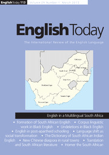
English Today
Scope & Guideline
Navigating the Complexities of English Language Studies
Introduction
Aims and Scopes
- Sociolinguistic Analysis:
The journal emphasizes the sociolinguistic dimensions of English, examining how language interacts with social factors such as identity, power, and culture across different communities. - Language Policy and Education:
A core focus is on language education policies, especially in multilingual contexts. The journal investigates how these policies shape English language teaching and learning experiences. - Corpus Linguistics and Language Variation:
Research often employs corpus-based methodologies to study language variation and change, providing insights into the evolving nature of English across different varieties and contexts. - Global Englishes:
The journal addresses the phenomenon of English as a global language, exploring its role in various countries and its impact on local languages and cultures. - Language and Technology:
There is an increasing interest in how technology influences language use, including the emergence of new linguistic forms and the role of social media in language evolution. - Cultural Studies and Language:
The journal also incorporates cultural studies perspectives, analyzing how English interacts with popular culture, media, and artistic expressions across different regions.
Trending and Emerging
- Multilingualism and English:
A significant trend is the exploration of English within multilingual contexts, focusing on its interaction with local languages and the implications for identity and communication. - Language and Social Justice:
There is a growing emphasis on issues of linguistic justice, examining how language intersects with social identity, pedagogy, and equity in education. - Impact of Technology on Language:
The influence of technology on language use is increasingly prominent, with research exploring how digital communication platforms shape language practices and innovations. - Cultural Representations and English:
Emerging studies are delving into how English is represented in popular culture, media, and global phenomena, such as K-pop, reflecting its cultural significance. - English in Global Contexts:
Research is increasingly focusing on English's role in specific global contexts, such as China and South Africa, highlighting the local adaptations and variations of the language.
Declining or Waning
- Traditional Grammar and Syntax:
There seems to be a waning interest in traditional grammar and syntactic analysis, as newer methodologies focusing on sociolinguistic and corpus-based approaches gain traction. - Prescriptive Language Ideologies:
Research that promotes prescriptive views of language use is becoming less common, with a shift towards descriptive analyses that embrace linguistic diversity and fluidity. - Focus on Native Speaker Norms:
There is a noticeable decline in studies centered on native speaker norms, as the journal increasingly highlights the importance of non-native varieties and English as a lingua franca.
Similar Journals
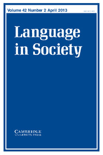
LANGUAGE IN SOCIETY
Advancing Understanding of Language and SocietyLANGUAGE IN SOCIETY, published by Cambridge University Press, is a leading interdisciplinary journal that explores the intricate relationship between language and social factors. With an impressive track record since its inception in 1972, this journal has become a critical resource for researchers and practitioners in the fields of linguistics, sociology, and political science, as evidenced by its high ranking in both the Q1 quartile and Scopus percentile rankings. In 2023, it was placed within the top 94th percentile among its peers in language and linguistics and the 93rd percentile in sociology. Furthermore, LANGUAGE IN SOCIETY provides an insightful platform for understanding language as both a social practice and a key element of identity and power dynamics. Although it does not currently offer Open Access options, its rigorous peer-reviewed content remains essential for advancing scholarship and informing professional practice in the study of language in diverse societal contexts. With its scholarly contributions, LANGUAGE IN SOCIETY continues to shape discourse and foster academic collaboration across disciplines.

Journal of Research in Applied Linguistics
Exploring the Frontiers of Language ResearchJournal of Research in Applied Linguistics is an esteemed academic journal published by Shahid Chamran University Ahvaz, Iran, focusing on the dynamic field of linguistics and language studies. With an ISSN of 2345-3303 and an E-ISSN of 2588-3887, the journal has established itself as a valuable resource for researchers and professionals aiming to explore diverse issues related to applied linguistics, including language acquisition, pedagogy, and sociolinguistic interactions. As part of a robust academic community since its inception in 2017, it is recognized with a Q2 quartile ranking in the world of linguistics and achieved impressive Scopus ranks reflective of its growing impact, particularly within the arts and humanities. The journal embraces an open access policy, enhancing its reach and availability to a broad audience. Researchers, educators, and students alike will find in the Journal of Research in Applied Linguistics a critical platform for dialogue, innovation, and contribution to the evolving landscape of language research.
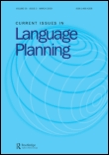
Current Issues in Language Planning
Charting New Territories in Language Planning StudiesCurrent Issues in Language Planning is a prestigious academic journal published by Routledge Journals, Taylor & Francis Ltd, focusing on the critical study of language planning and policy. Established in 2008 and converging until 2024, this journal plays a pivotal role in the field of linguistics and education, as evidenced by its impressive Q1 rankings in both Education and Linguistics and Language categories. With a robust Scopus ranking, placing it in the 94th percentile for Arts and Humanities and Social Sciences, it offers a highly respected platform for researchers and professionals to share innovative ideas and findings. Although it is not an open access journal, it provides valuable insights into current debates and developments in language theory and planning, making it indispensable for scholars and students dedicated to advancing their expertise in these vital areas. The journal's contributions are essential for understanding the intricate relationship between language, society, and education policy.
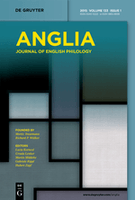
ANGLIA-ZEITSCHRIFT FUR ENGLISCHE PHILOLOGIE
Connecting Scholars Through Rich Literary DiscourseANGLIA-ZEITSCHRIFT FUR ENGLISCHE PHILOLOGIE, published by WALTER DE GRUYTER GMBH, stands as a significant periodical in the fields of Linguistics and Literary Theory. With a rich publication history dating back to 1878 and ongoing contributions until 2024, this esteemed journal serves as a vital resource for researchers, professionals, and students interested in the evolution of the English language and literature. Although it does not currently offer open access, its rigorous peer-reviewed articles have secured a respectable standing, ranking Q3 in Linguistics and Language and Q2 in Literature and Literary Theory as of 2023. The journal, located in Berlin, Germany, continues to drive academic discourse and foster scholarly engagement in the intricacies of English philology, making it an essential platform for the latest research and developments in the field.
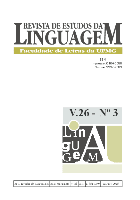
Revista de Estudos da Linguagem
Pioneering Insights in Linguistics and EducationRevista de Estudos da Linguagem, an esteemed academic journal published by the Universidade Federal de Minas Gerais within its Faculty of Letters, serves as a vital resource for scholars in the fields of linguistics and education. Since its inception in 1992, the journal has embraced an open access model, ensuring that research is accessible to a broader audience, thereby fostering collaboration and knowledge dissemination. Based in Brazil, this journal focuses on a wide array of topics related to language studies, contributing significantly to the discourse within the linguistics community. While recent rankings place it in Q4 in Education and Q3 in Linguistics and Language categories, its dedication to publishing high-quality research continues to attract attention despite its current Scopus rankings. The journal notably ranks at #668 in Language and Linguistics, verifying its emerging impact in the academic landscape. Researchers and students alike will find the journal's commitment to diversity in linguistic research a compelling reason to engage with its articles. The journal's offices are located at AV ANTONIO CARLOS, 6627 PAMPULHA, BELO HORIZONTE, MG, BRAZIL, and it continues to invite contributions that challenge established norms and explore innovative themes within the dynamic realm of language studies.
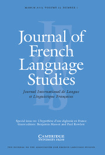
Journal of French Language Studies
Unveiling New Dimensions of French Linguistic ResearchJournal of French Language Studies, published by Cambridge University Press, is a prestigious and leading journal in the field of linguistics and language that provides a platform for scholarly articles and research findings relevant to the French language and its various dimensions. With an impressive Q1 ranking in the 2023 categorization and ranked #257 out of 1088 in Scopus for Language and Linguistics, this journal plays a pivotal role in advancing the study of French linguistic methodologies, sociolinguistics, and applied linguistics. Since its inception in 1991, the journal has continually contributed to the academic community, attracting innovative investigations and theoretical discussions that enrich understanding and research in the field. Researchers and students enjoy comprehensive access to critical analysis and emerging trends, and as it continues to converge towards 2024, the journal promises to remain an essential resource for exploring the evolving landscape of French language studies.

Iberica
Exploring the frontiers of language and communication.Iberica, an esteemed journal published by AELFE, serves as a vital platform for scholarly discourse in the fields of linguistics and language studies. With its inception as an Open Access publication in 1999, Iberica has democratized access to high-quality research, fostering an environment of collaboration and innovation among researchers and professionals alike. Based in Spain at UNIV JAUME I, the journal has witnessed a remarkable ascent in the 2023 category quartiles, achieving a Q1 ranking in Linguistics and Language. Furthermore, its impressive Scopus rankings place it in the top 25% within both the Arts and Humanities and Social Sciences disciplines. Covering a diverse range of topics from theoretical linguistics to applied language studies, Iberica offers a compelling opportunity for academics seeking to contribute to and engage with contemporary issues in the linguistic landscape. As it converges in its publishing years from 2008 to 2024, it continues to set the standard for excellence within its field, making it an essential resource for students, researchers, and language professionals.

RUSSIAN LINGUISTICS
Bridging traditional linguistics with modern scholarship.RUSSIAN LINGUISTICS is a peer-reviewed academic journal published by Springer, dedicated to advancing the understanding of the Russian language and its interplay with various linguistic frameworks. With a longstanding history that spans from its inception in 1974, the journal encompasses a broad range of topics within the fields of linguistics and language studies, offering valuable insights especially in *Developmental and Educational Psychology* and the intricacies of linguistics at large. Currently ranked in the Q2 quartile for Linguistics and Language, and holding substantial positions within Scopus rankings, RUSSIAN LINGUISTICS serves as an essential resource for researchers, educators, and students alike, fostering dialogue and collaboration within the international linguistic community. The journal notably provides critical access to research findings that enhance the comprehension of Russian linguistics' role in a global context, despite operating under a traditional access model. For those pursuing scholarly excellence, RUSSIAN LINGUISTICS remains a pivotal platform for disseminating innovative research and promoting the study of language.
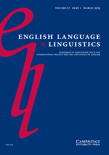
English Language & Linguistics
Pioneering Research in English LinguisticsEnglish Language & Linguistics is a prestigious journal published by Cambridge University Press, specializing in the dynamic fields of linguistics and language studies. With an impressive Q1 ranking in both Linguistics and Language categories for 2023 and a notable placement in the Scopus metrics, where it ranks #142 out of 1088 in Arts and Humanities, the journal is recognized for its high-quality research contributions and robust impact in the scholarly community. Since its inception in 1997, English Language & Linguistics has provided a forum for researchers to explore various aspects of language, facilitating the dissemination of innovative ideas and empirical studies. With no open access options currently available, the journal remains a valuable resource within the United Kingdom and beyond, fostering a deeper understanding of language intricacies and their broader societal implications. For practitioners and academicians alike, this journal is a critical resource for keeping abreast of the latest advancements in linguistics.
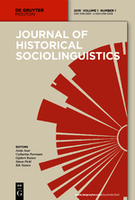
Journal of Historical Sociolinguistics
Connecting Historical Contexts to Linguistic ChangeThe Journal of Historical Sociolinguistics is a distinguished publication focusing on the intricate relationships between language and society from a historical perspective. Published by WALTER DE GRUYTER GMBH in Germany, this journal (ISSN: 2199-2894, E-ISSN: 2199-2908) is recognized for its rigorous scholarship, ranking in the Q2 quartile in Linguistics and Language (2023), highlighting its relevance and impact within the academic community. With Scopus rankings placing it at #326/1088 in Arts and Humanities and #386/1167 in Social Sciences, this journal is essential for researchers and scholars interested in the dynamics of language evolution, sociolinguistic shifts, and historical context. Through its insightful articles and contributions, the journal aims to illuminate the nuanced interplay between linguistic change and social factors over time, making it an invaluable resource for students, professionals, and academics alike. The journal operates under an open-access model, ensuring that knowledge is disseminated widely and freely accessible to those engaged in the cutting-edge studies of sociolinguistics.